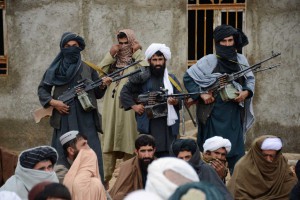Afghanistan’s Taliban are closing ranks around their new leader after months of infighting that followed the death of Mullah Mohammad Omar, which could allow the insurgents to speak with one voice in hoped-for peace talks but will also strengthen them on the battlefield.
The Afghan government’s announcement last summer that Mullah Omar, the reclusive one-eyed founder of the group, had died two years earlier in Pakistan aggravated longtime rifts within the movement. Many senior figures said his deputy-turned-successor, Mullah Akhtar Mansoor, had deliberately misled them.
The upheaval led to the collapse of Pakistan-brokered face-to-face talks between Kabul and the Taliban after just one round, and clashes flared between Mansoor loyalists and a splinter group led by Mullah Mohammad Rasool, which declared him the leader of the Taliban in November.
But Abdul Rauf, a Taliban commander close to Rasool, said senior Taliban figures who had objected to the rapid and secretive succession are now reluctantly returning to the fold. “We all took a stand against Mullah Akhtar Mansoor, but now one by one we are joining with him without demanding any changes,” he said.
Relatives of Mullah Omar, notably his brother Manan and son Yaqub, had objected to the selection of Mansoor, which was done by a small inner circle of senior Taliban leaders. But they were persuaded last year to drop their objections and publicly declared their loyalty to Mansoor.
Rauf said Abdul Qayum Zakir, a military commander sacked by Mansoor in 2014, and former Rasool loyalists Abdullah Jan and Niaz Mohammad, had also reconciled with Mansoor. Mullah Hassan Rahmani, who was governor of southern Kandahar province when the Taliban ruled Afghanistan from 1996 to 2001, issued a statement last month saying he too would support Mansoor.
The Taliban’s former foreign minister, Mohammad Ghaws, said he hoped the united front would help future peace talks succeed. “I am not in favor of or against any faction,” he said, but if Rasool had continued to oppose Mansoor and the majority allied with him it would have brought “no good to the Taliban or to Islam.”
While Rasool has yet to reconcile, Mansoor had sent his representatives to meet with him in western Farah province, Ghaws said. “There is no religious reason for him (Rasool) not to come with the majority, and so I believe we will be fully united very soon.”
The Taliban’s growing unity – brokered by religious scholars within the movement – has raised hopes that the group can be brought back into peace talks to end 15 years of war.
Afghanistan, Pakistan, the United States and China plan to hold a third round of talks on Saturday to lay the groundwork for the renewal of direct talks between Kabul and the Taliban. The Taliban’s top leadership is widely believed to be based in Pakistan, and Islamabad is seen as having a key role in bringing them to the table.
Afghanistan has vowed to wipe out any insurgents who do not join the peace process, while the Taliban have adhered to their demands for the withdrawal of all foreign forces, the release of Taliban prisoners and the establishment of some form of Islamic rule.
“Hopes for peace are increasing because the United States and China are involved – these two world powers have a great influence on Afghanistan and Pakistan, and can pressure both countries to encourage the armed opposition to come to the negotiating table,” said Abdul Hakim Mujahid, a senior member of Afghanistan’s High Peace Council, which is tasked with negotiating an end to the war.
Political analyst Nazar Mohammad Mutmaeen said the Taliban’s newfound unity would be “effective and useful” for the peace process.
But it could also make them even more formidable on the battlefield. The Taliban have advanced on a number of fronts since the U.S. and NATO formally ended their combat mission and shifted to a supporting role more than a year ago. As the snow melts in the rugged mountains along the Afghanistan-Pakistan border in the coming months, the insurgents are expected to launch their annual springtime offensive.
Even with all the infighting, the Taliban managed to seize the northern city of Kunduz last year and hold it for three days, marking the insurgents’ biggest foray into a major urban area since 2001.
“The Taliban leadership is fragile, but the movement is not,” said a Western official in Kabul who has seen intelligence reports on the group. The official was not authorized to brief media on the subject so spoke on condition of anonymity.
Mansoor is “first among equals, but there are many equals whose support he doesn’t have,” the official said. Those commanders now appear to have set aside their misgivings about him because of a “realization that it is better to be working together.”
ap.org



